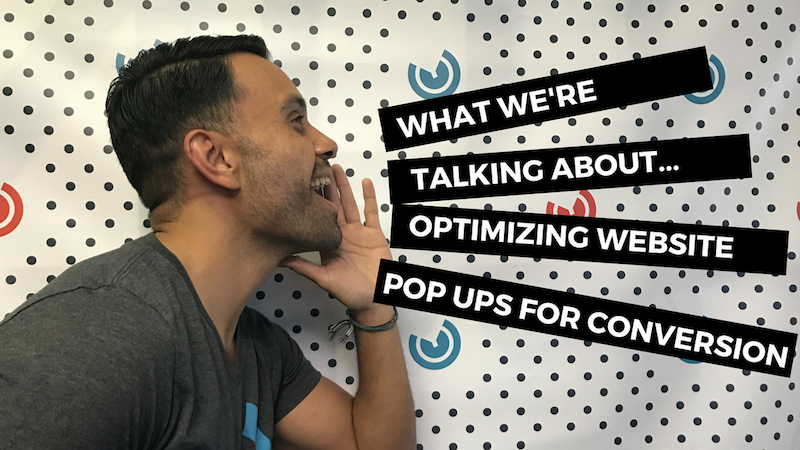What We're Talking About...Optimizing Website Popups for Conversion
Do you think pop-ups are annoying? Me too! In fact, they can something feel as interruptive as getting spam delivered in your inbox or a sales call...
I know what I am looking for, and would like to chat.
A team of data-driven marketers obsessed with generating revenue for our clients.
Because the proof is in the pudding.
At Campaign Creators we live by three principles: Autonomy, Mastery, Purpose.
5 min read
![]() Tammy Duggan-Herd
:
8/15/17 2:43 PM
Tammy Duggan-Herd
:
8/15/17 2:43 PM

These days, more and more companies are adding lead management software to their marketing plans. A lead management system is invaluable when it comes to processing and storing information on high volumes of digital leads. When properly implemented, an automated process can save massive amounts of time and effort for your sales and marketing teams.
So with plenty of options on the market, how do you make sure you're investing in a software that is not only generally well-developed, but a good match for your company, as well? We're giving you a head start on your research by going over 7 essential questions which you should ask yourself along the path toward choosing an effective and modernized lead management strategy.
First of all, we should take note that there are actually 3 distinct kinds of lead management software: ERP systems, CRM systems, and marketing automation systems. Each has a focus that may or may not be advantageous for your business; you may find yourself needing to combine software, though integration can get tricky.
It is important to examine ongoing costs as well as upfront ones when comparing your options. Unsurprisingly, a system with more features will come at a higher cost. You may be tempted to choose a free application— these DO exist!-- but they are usually extremely stripped-down versions with limited features and user access.
Monthly prices can begin in the single digits and range into hundreds of dollars per month for advanced features. Payment processes also differ; for instance, while cloud lead management software comes with a monthly or annual subscription cost, on-premise software has a one-time perpetual license fee.
Fees can come crawling out of the woodwork with the purchase and installation of any kind of software, and a lead management system is no exception. Additional financial investments include possible setup help from a consultant, and recurring fees for support, training and updates. It's up to you to decide what features and conveniences are worth the cost. This brings us to our next question...
On one hand, a degree of customization is essential for adjusting a lead management system for your company's specific needs. However, the process can become overly complicated if a balance between customizable features and easy-to-navigate UX isn't established. You may decide to hire a consultant to help you maximize the capabilities of your system, but most of your staff should at least be able to navigate the basics.
Prioritizing ease of use doesn't necessarily have to come at the cost of advanced features. Just keep the less tech-savvy members of your team in mind when comparing your options! A related question can help you narrow down things further.
Generally, this kind of software is designed to be broadly applicable, but this isn't to say that some softwares aren't better suited for certain industries. Some CRM systems, for example, are geared toward business-to-business processes, but others are better suited for business-to-consumer operations. Also, certain companies like pharmaceuticals have fairly strict protocols with which the software should comply.
In its handy 2017 list of the best lead generation software (which is worth taking a look at, to say the least), SoftwareAdvice includes an “industry” filter alongside price and size categories. Every field from real estate to healthcare to agriculture is covered, and while most of the choices offered overlap between industries, it is better to narrow down your best candidates as much as possible.
Cloud-based software, which has become widely adopted by businesses in recent years, is hosted on the software vendor’s servers and accessed online. In contrast, on-premise software is installed locally, on a company’s own computers and servers. Ultimately, the choice comes back to previously discussed topics of price and customization.
Companies with fewer specialized needs who are willing to trust their seller to provide security will do well with a cloud system. And those seeking greater control of their software in addition to offline access may be better off with an on-premise choice. Next, we look into what the future holds.
Lead management softwares come tailored for a variety of company sizes. Some, like Experiture and Mailigen, are designed pretty exclusively for small businesses; others, like Cosmos IMP, work best for medium to large-sized companies; still others, like SAP Hybris and HubSpot Marketing, are more flexible and span the board.
It's important to be honest with yourself in considering how much your business is projected to grow in a particular timeframe. When doing your research, look into the size category with respect to both the magnitude of the content the software will need to manage and the number of users (employees) that will be working with it.
One of the reasons we're personally big fans of HubSpot products is the ease of integration in their software. Their lead management tools are fully compatible with HubSpot CRM, Salesforce, and virtually any other CRM system. Take into into account resources beyond Microsoft Office applications that you might also need to connect to your software, including:
Your website and specifically website forms, from which new leads are imported
Accounting software to share customer financial data or to automate order processing
An e-commerce platform
A web portal so customers can make service requests and receive status updates
Other applications like e-marketing software and card scanners
Take the time to determine which of your existing systems the software will be compatible with to save yourself money, time, and a few headaches.
These questions cover the main aspects of lead generation software, but don't hesitate to add more to your own list of qualifications! The more you understand about your system criteria when you make your decision, the faster you'll have it up and running to manage your leads on a whole new level.
A great lead generation strategy requires comprehensive knowledge of the process. If you're looking to boost your lead-generating game, check out our Intro to Lead Generation guide for help assessing your lead quality, raising awareness for your lead generation campaign, and more.
This blog is part of Your Definitive Guide to Conversion Rate Optimization blog series.

Do you think pop-ups are annoying? Me too! In fact, they can something feel as interruptive as getting spam delivered in your inbox or a sales call...

Often marketing strategies focus so much on attracting and netting new customers, that it’s easy to forget about the ones you already have. But with...

So, you're in the market to buy a martech solution for a specific problem. After a quick search, you quickly realize there are over 7000 different...